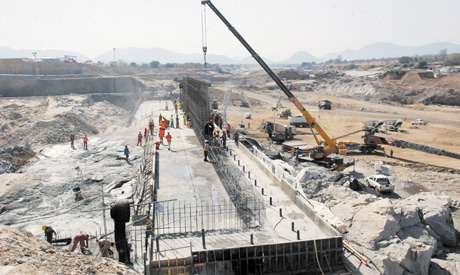
The GERD, which is nearly 70 per cent complete, is due to generate more than 6,000 megawatts (photo: AP)
Egypt said it is committed to negotiations on the filling and operation of the disputed Grand Ethiopian Renaissance Dam (GERD) amid media reports that it has fallen back in talks with Ethiopian and Sudanese counterparts during the latest two-day round of meetings in Khartoum.
“We are committed to our statements on the meetings. We are responsible for our statements, and so are they [Ethiopians],” Egyptian irrigation ministry spokesman Mohamed El-Sebaie told Ahram Online.
Several media reports quoted Ethiopian water and irrigation minister Seleshi Bekele as saying that Egypt has ceded on a condition stipulating an annual flow of 40 billion cubic metres.
“We can’t deny or confirm such statements,” El-Sebaie said, yet acknowledging that the ministry was aware of the news.
The time frame for filling the dam has also been among the major obstacles during previous tripartite talks, often causing negotiations to break down.
Egypt has proposed a seven-year time frame, which would keep water levels in the country's Aswan High Dam above 165 metres.
Shortly, Egypt’s irrigation ministry released a statement where it said it has presented an “alternative formulation” to connect GERD and its Aswan High Dam to “accomplish the interests of both parties”.
The statements come a few days after the irrigation ministers of Egypt, Ethiopia, and Sudan met in the Sudanese capital of Khartoum to resume negotiations on the GERD.
The Khartoum-hosted talks are the third of four rounds of talks being held in accordance with an agreement reached in a US-brokered meeting between the three parties in Washington in November, which saw the attendance of representatives of the US government and the World Bank and aimed to break a deadlock in negotiations.
Egypt has stressed in its statement following the conclusion of the meetings held on Saturday and Sunday on an agreement which "accomplishes the interests of the three countries", abstaining from providing further indicators about the course of talks.
However, Sudan’s irrigation minister said the three countries have come closer to aligning their views on filling the reservoir and operating the hydroelectric dam.
The three sides are set to continue talks in the Ethiopian capital on 9-10 January, ahead of two decisive meetings in the same week.
The foreign ministers of Egypt, Ethiopia, and Sudan are converging on 13 January to discuss the dispute in a second follow-up after the 9 December meeting.
The meetings are part of a roadmap agreed upon during talks last month in Washington that set 15 January as the targeted deadline for resolving the dispute.
Ethiopia hopes that the $4.8 billion GERD project on the Blue Nile, which has been under construction since 2011, will allow it to become Africa’s biggest power exporter.
Egypt, however, fears that the Ethiopian dam, which is 70 percent complete and set to be fully operational by 2022, will diminish its share of Nile water, which comprises 85 percent of the country’s water resources.
Short link: